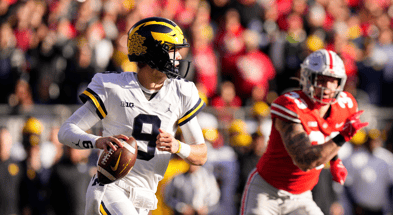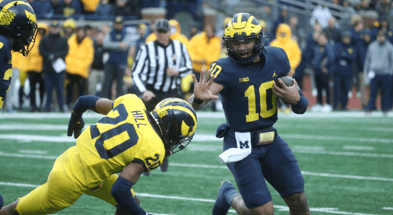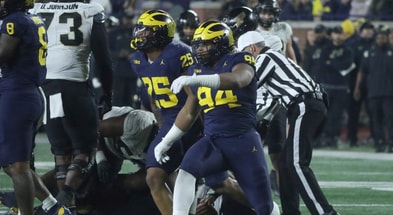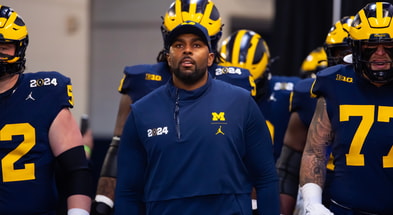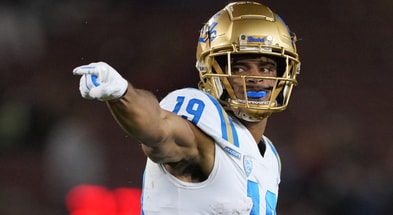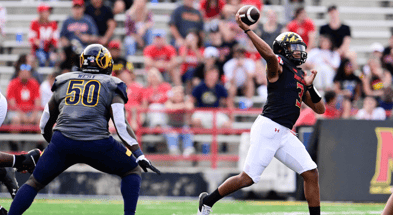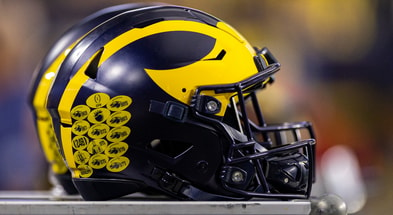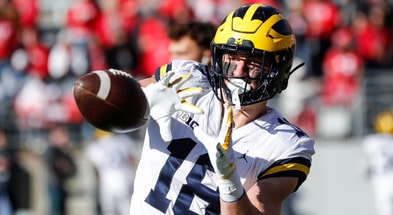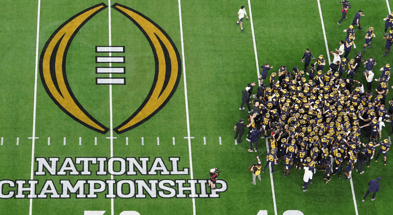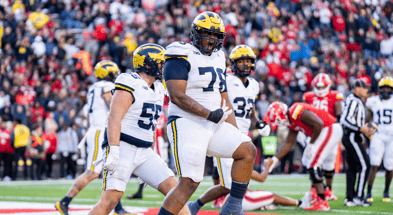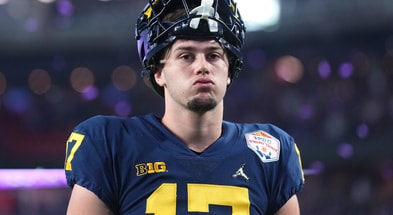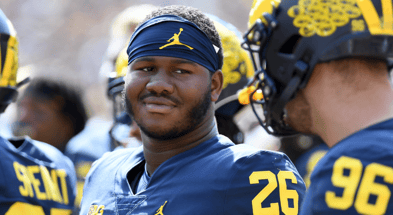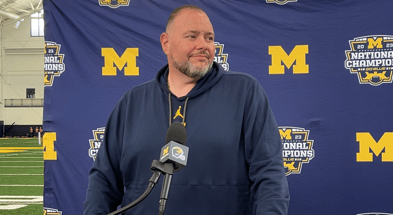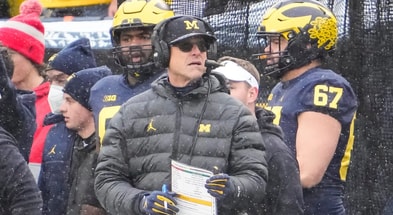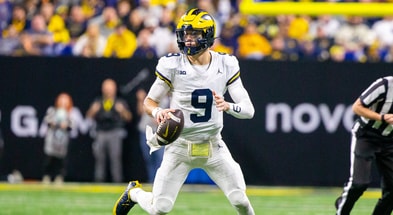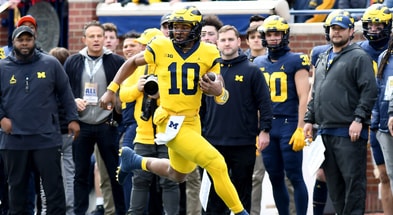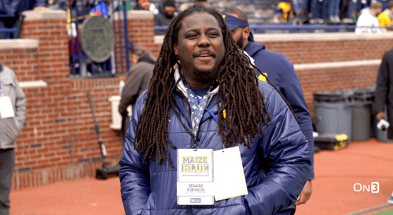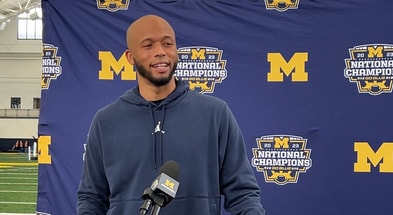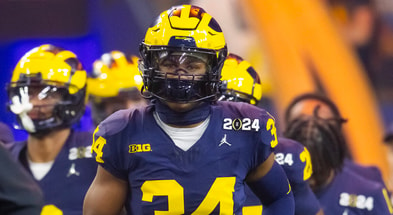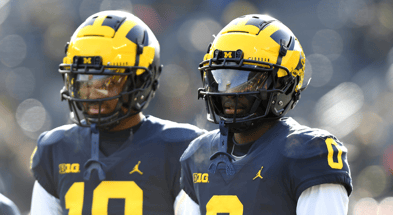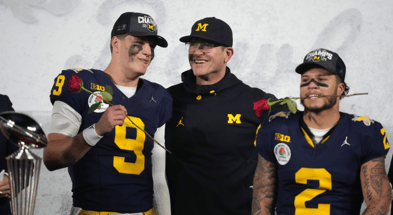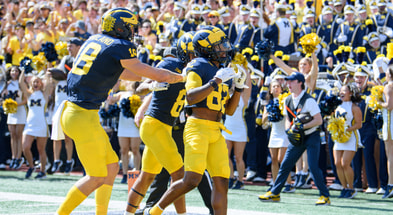Q&A: Valiant CEO Jared Wangler goes in depth on Champions Circle, Michigan NIL
Champions Circle, a donor-driven NIL collective, launched Friday with a focus on providing opportunities for compensation to current Michigan student-athletes. Valiant Management partnered with U-M boosters to form the company and will exclusively help facilitate NIL growth through connections with alumni, local businesses and national brands.
Valiant CEO Jared Wangler participated in the following Q&A with TheWolverine.com to discuss Champions Circle and Michigan NIL in depth:
What is Champions Circle?
Wangler: “Some schools are using [collectives] to put together compensation packages for recruits, and some schools are doing it above board, which is pulling capital together to focus on creating NIL opportunities for your current student-athletes. So, essentially what we did was, we worked with some of the prominent donors at the University of Michigan – and we’re still growing that list weekly – to put together a collective compensating our current student-athletes. We’re drawing a line in the sand by saying that we will not be entertaining anything with prospective student-athletes and that we’re just looking to maximize earning opportunities for our current student-athletes.
Champions Circle is a separate company from Valiant. It’s a collective, and Valiant is the sports marketing agency that is working with this collective to set up and to curate NIL deals for our student-athletes.”
Prospective v. Current – NIL’s biggest conflict
Wangler: “At several other schools, and I won’t call them out, but they’re just openly offering recruits and saying, ‘hey, come to our school and we’re going to give you a million dollars to come to our school,’ or ‘we’ll give you two million dollars per year for the next three years to come to our school.’ That is illegal. That is against the NCAA rules. That is inducing a prospective student-athlete by guaranteeing them some sort of compensation package. We dislike that model because we think that it can implode a locker room. We think that disincentivizes a 17, 18-year-old to actually earn it when they get to college. You’re compensating them for something when they haven’t even stepped on the field.
We are going to be working with our collective to find NIL opportunities for the student-athletes that are doing things the right way, that are developing on and off the field. We hope that by doing this we are incentivizing student-athletes to continue to develop at the University of Michigan and making sure the top athletes are getting compensated through NIL at the highest level.”
How will this impact Michigan overall?
Wangler: “It brings Michigan a seat at the table in terms of having a very competitive NIL program. When you’re looking around the country, there’s obviously two sides to NIL: sports marketing and the collective. I feel like we’ve been very competitive on the sports marketing side of it given the amount of brand deals our student-athletes are getting and group licensing deals that are set up through our official retailing partner. I feel like we’ve really maximized that category, and we will continue to maximize it. But then with the collective side of it, we just weren’t there yet. Now that we’re there, we believe that we’ll be able to maximize the entire picture for our student-athletes.”
Transformational v. Transactional – Thoughts on Harbaugh’s message and NIL balance
Wangler: “The main point is — it’s not about the money. It’s about transforming as a student-athlete. It’s about coming to Michigan and in 30 years that’s how you judge it. That’s what it’s about. Coming to Michigan is supposed to be transformational. Your decisions shouldn’t be made based on a dollar amount. I still believe that. Even though we’re putting together the engine that’s going to be driving the dollar amounts, it’s not about that. We’re going to try to find ways to make it where we’re incentivizing development off the field, and you will earn dollars off that, but you’re inevitably encouraging people to take a step forward and do things the right way.
[Harbaugh]’s quote is kind of the ethos of the group. We’re not going to guarantee you any dollar amount. If you’re a recruit, if you’re an NIL agent trying to wheel and deal a high schooler, we’re not entertaining that. We just know we’re going to focus on getting our current student-athletes as many NIL opportunities as possible.”
How much of a role do collectives play in the ability to compete now? How much money has to be involved to stay alive?
For context – Ohio State head coach Ryan Day recently stated the Buckeyes would need a $13 million NIL budget to keep the football roster intact, according to Cleveland.com.
Wangler: “I don’t really know a number. I can’t really put a figure to it, but it’s a big number. You’re hearing stories and don’t know what’s real or what isn’t on what kids are being promised or what kids are making at other schools. But let’s call it what it is, college sports is a billion-dollar industry. You have alumni that are very involved. There are businesses that are built upon the success of different programs at a university. Enrollment, it goes up when teams are winning. There are a lot of things that the performance of a football team, a basketball team and a healthy athletic department do for a university’s business model. I don’t really know the number for it. I just know that we’re looking to have the biggest number in the country, and we want to find ways to maximize NIL for all of our student athletes.
It’s not going to be just the starting quarterback, or the starting right tackle, or the starting running back that’s making all the money on this. I played football at Michigan. I was a full back and a special teams guy. I know you need those players for a successful team. The locker room needs to have that camaraderie where everybody has a piece of the pie. It can’t be so top-heavy that you’re causing rifts in the locker room.”
What do you gain from all of this?
Wangler: “I didn’t go into this building Valiant, the sports marketing agency, to say one day we’re going to work with a collective and earn money that way. I wanted to be a sports agent. I was interning for an NFL agency before I came back and started Valiant and figured I’d just be doing sports marketing deals for U-M student-athletes as I could build up and potentially be an NFL agent. That may still be the goal. I’m not 100 percent positive. I’ve got to see where this takes me now, but I guess the gain out of it is professional development for wanting to be an agent and continue down that path.
Obviously, there’s a business model around this. We’re an agency. We’re finding athletes deals and taking a commission off the deals we do just like any other agency. We just continue to build it accordingly. There’s a hole, too. Michigan needs a solution for NIL, and the way the laws are written right now they can’t facilitate it. Being this third-party group, it’s like a passion. I played for Coach Harbaugh. I feel like we’re providing a necessary service for the university, and we want to do this thing right because we know it’s going to help Michigan stay competitive.”
